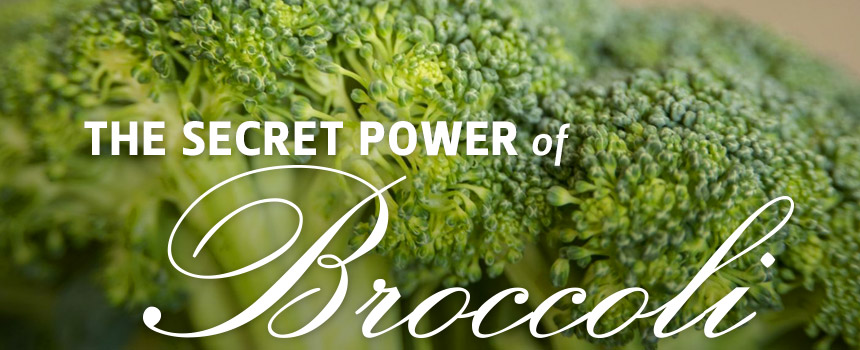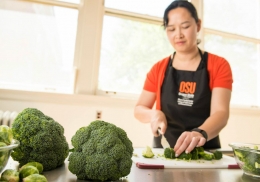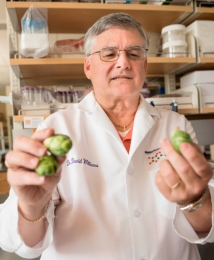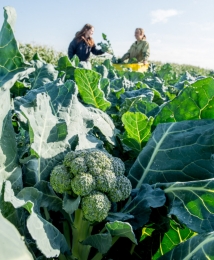The Secret Power of Broccoli

Broccoli is Emily Ho’s favorite vegetable. Not many people have a favorite vegetable, and I’d guess that even fewer would pick broccoli. The 5-year-olds in my family won’t touch broccoli because, they say, it tastes like stinky socks. But those 5-year-old critics have zeroed in on what Emily Ho finds fascinating.
It’s sulforaphane, a sulfur compound found in broccoli and its cruciferous cousins that is proving to be a powerful weapon in the fight against cancer.
You know that vegetables are good for you; they are full of nutrients essential to maintaining a healthy body. But Ho and her colleagues at Oregon State University are investigating compounds in vegetables beyond the essential nutrients, compounds that can protect you against diseases such as colorectal, breast, prostate, and liver cancers. And some of those plant compounds may extend that disease protection to your children, and even to your grandchildren.
Most people understand the link between smoking and cancer; far fewer of us make the connection between food and cancer. But data show one-third of all cancers are linked to diet, according to Ho, the director of OSU’s Moore Family Center for Whole Grain Foods, Nutrition, and Preventive Health in OSU’s College of Public Health and Human Sciences.
[caption caption="OSU researchers are examining how compounds in vegetables such as broccoli, Brussels sprouts, and cauliflower can help prevent cancer. (Photo by Shawn Linehan.)"] [/caption]
[/caption]
Despite major reductions in some other types of human diseases, cancer deaths in the US have remained at about the same rate since 1950. Breast and prostate are among the most common cancers in the US, but their numbers are low in Japan. However, for Japanese people who move to the US, their incidences of breast, prostate, and colon cancers increase more than 10-fold. These trends could be linked to a whole host of possible factors, Ho says, including the adoption of a western-style diet with more meat, fat, and refined carbohydrates, and far fewer vegetables.
Eating well should be an easy, pleasurable habit for Oregonians, since we live in a cornucopia of high quality vegetables, nuts, fruits, and grains. However, Ho says Oregonians are only average among Americans in their consumption of whole plant-based foods, and well below what is recommended. Only one in four adults is eating the recommended 5 to 9 servings of fruits and vegetables a day. Our children are eating even less.
So what, you ask? You’ve given up smoking, shunned hotdogs for lunch, and manage to walk 3,000 steps each day. Isn’t that enough? Do you really have to eat vegetables?
Vegetables are nutritious, certainly. But Emily Ho, Dave Williams, and other scientists in the Cancer Prevention and Intervention program at OSU’s Linus Pauling Institute, see additional therapeutic value in the non-nutritive compounds in vegetables, especially in the stinky-socks compounds in broccoli, Brussels sprouts, and cabbage.
[caption caption="Dave Williams, a biochemist in OSU’s College of Agricultural Sciences, studies how a mother’s intake of indole-3-carbinol (a compound found in cruciferous vegetables) can reduce the risk of cancer in her offspring. (Photo by Shawn Linehan.)"] [/caption]
[/caption]
Dave Williams was one of the first researchers to demonstrate that diet can help protect you against cancer, even before you are born. And some of those protective benefits from your prenatal diet can last you into adulthood. His research focuses on a group of bad-actor chemicals called polycyclic aromatic hydrocarbons (PAHs) that are formed when burning organic material, including wood, cigarettes, and petroleum.
“PAHs are among several chemical carcinogens that are capable of crossing the placenta during pregnancy and causing cancer later in the offspring’s life,” said Williams. In a series of laboratory tests, he gave pregnant mice a single dose of PAHs a few days before they gave birth. Not surprisingly, their offspring developed cancers later in life. He gave another group of pregnant mice multiple doses of a chemical found in cruciferous vegetables, called indole-3-carbinol, in addition to the single dose of PAHs. Those baby mice experienced half the incidence of cancer later in life.
“It became clear that, in mice, indole-3 provided significant protection against lymphoma and, later on, lung cancer,” Williams said. “We found that you can change a mother’s diet and improve her offspring’s chances of surviving cancer later in life.” None of the infant mice received the protective supplement later in their life, at any stage beyond breast feeding. The protective effect of the compound came solely from maternal intake during pregnancy and nursing, but it lasted into the animal’s adulthood.
Cancer is a complex disease linked to many factors, including heredity and environment. New research demonstrates that diet can play an important role in preventing and treating cancer—even if genetics aren’t in your favor. Sulforaphane, the compound that fights cancer and puts a sourpuss face on a 5-year-old, normalizes DNA function. That means that broccoli contains the necessary ingredients to switch on genes that can protect us from cancer, or switch off over-active genes that can lead to cancer. As Ho explains, DNA is the playbook for our cells, providing all the information the body needs to function properly. DNA damage is when a page is ripped out of the playbook, and cells lose track of the game. They begin to divide rapidly, unchecked, and eventually develop into tumors.
[caption caption="OSU nutrition scientist Emily Ho and research associate Laura Beaver (at microscope) are tracking sulforaphane, a potent compound that can switch on a genetic process to suppress or kill cancer cells. (Photo by Hannah O'Leary.)"] [/caption]
[/caption]
DNA is a really long, tightly packed molecule, like a playbook squeezed into an accordion fold and held tight with a latch. So-called epigenetic damage doesn’t affect the pages of the book, but might damage the latch or crumple a fold. Genetic damage (think of it as a page ripped out of the DNA book) is very difficult to correct. But epigenetic damage—a broken latch or a crinkled fold—can be fixed.
Epigenetic alterations change the way DNA is read, but not the DNA itself, and they are not necessarily permanent. That has changed everything in cancer research. For decades cancer has been known as a disease caused by genes undergoing mutations that trigger the growth of cancer cells. But new research in epigenetics shows that many cancers may not be caused by gene mutations but by changes that alter how the genes function. A tumor suppressor gene, which normally regulates cell growth and death, can be “turned off” or silenced by an epigenetic modification.
But I hate broccoli, you say, so can I consume a supplement? Yes, but. Ho’s research shows that less of the sulforaphane makes it into the body from supplements and besides, you won’t get all the other nutrients that are in whole broccoli.
However, to get enough of the cancer-fighting compound would require chowing down a lot of broccoli. Luckily, sulforaphane is concentrated in tender, young broccoli sprouts. “I could ask you to consume 50 cups of broccoli or one cup of broccoli sprouts,” Ho said, and that’s just what she’s asking a test group of men in the Veteran’s Administration Hospital in Portland, in a study she’s doing in collaboration with Oregon Health Sciences University.
[caption caption="Broccoli has been the subject of horticulture research at OSU for several years. Now it is the focus of cancer research at OSU's Linus Pauling Institute. (Photo by Stephen Ward.)"] [/caption]
[/caption]
“This study is one of the first to show how sulforaphane can alter gene expression in metastatic prostate cancer cells,” said Ho. “The compound engages a process to re-express tumor suppressors, leading to the selective death of cancer cells and slowing disease progression.”
Prostate cancer is one of the most commonly diagnosed cancers in the U.S. Although often slow growing, prostate cancer can become much more aggressive if it metastasizes to other areas of the body, at which point survival rates decrease dramatically. Sulforaphane has been shown to selectively target and kill cancer cells while leaving normal prostate cells healthy and unaffected.
Similarly, in clinical trials, Ho and colleagues have shown that sulforaphane slowed the growth of breast cancer cells, especially at early stages. Sulforaphane appears to help “switch on” the expression of tumor suppressor genes that often become silenced in cancer cells. In a growing number of studies, sulforaphane has been shown to be effective in fighting several human cancer cell lines, including prostate, breast, ovarian, colon, and pancreatic cancer.
“This is very encouraging,” says Ho. “Dietary approaches to cancer have traditionally been limited to preventing the onset of disease, but we’re seeing how diet can also help slow the growth of existing tumors.” The evidence now shows that sulforaphane could have therapeutic value against several forms of cancer, including late-stage, metastasized disease, making it a valuable addition to existing cancer therapies, helping them to work better.


